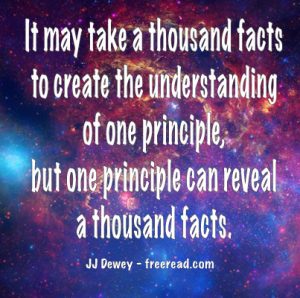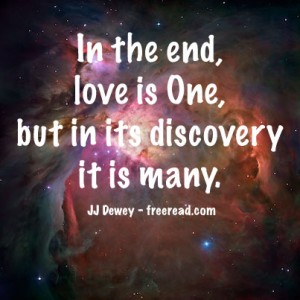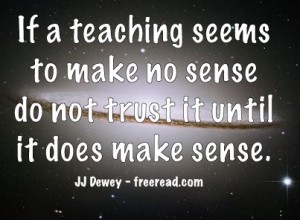
Principle 100
Service
Principle 99 was sacrifice, the keynote of the Piscean age. We are now moving on to focusing on service, the keynote of the Aquarian Age.
First, let us put into words the principle behind this word. The average person merely thinks of service as one person performing a beneficial labor for another that may or may not involve monetary payment.
This is well and good but the principle goes deeper.
The Principle that motivates service goes right back to the Source, the Life of God Itself, and was symbolically taught by the Master himself in these words: He said that God “maketh his sun to rise on the evil and on the good, and sendeth rain on the just and on the unjust. For if ye love them which love you, what reward have ye? do not even the publicans the same?” Matt 5:45-46
The sun is a symbol of light and life, and the rain a symbol of love and giving. Together they represent the great all-encompassing principle of service rendered to us by our Father-Mother God. We receive all that we need to make life worthwhile whether we deserve it or not by means of the greater servant – God.
Then Jesus tells us to follow this example and extend this service, not just to the ones we love, but to all.
One only truly applies the principle of service when he sees himself as a servant of the whole rather than just the part.
During the Piscean Age we placed our main attention on sacrificing for a cause with service being kind of an afterthought. The service that was emphasized was directed toward the part, the group, the brothers in arms so to speak. Now we must learn the lesson demonstrated by our Great Lord and serve both the part, but the whole.
After all is it not written:
“For God so loved the world, that he gave his only begotten Son…” John 3:16
And who is in the world?
All of us – the good, the bad, the ugly and the beautiful. All are loved by God and all are served by the Father of Lights.
The true servant will look for opportunities to assist and to help whether the person, group or people are deserving or not. If the part is elevated the whole is elevated.
Even though the servant needs to look at the good of the whole he must still allocate his energies wisely or else few if any will benefit. Unlike the sun we, as individuals, are unable to be of service to everyone on the planet. Instead, each of us has a circle of influence within which we are capable of serving in a beneficial way.
And when you think of it even the sun has its limitations. Yes, it is a great light for our solar system but there are over 200 billion solar systems just in the Milky Way Galaxy alone. The sun serves us with its great energy, but provides negligible heat and light for other star systems.
The efficient servant then must discover his circle of influence and concentrate his efforts there while always having the good of the whole in view. Here are some people to consider.
(1) His or her family. Our parents, our children, our brothers and sisters and extended family are all prospects for true service. Most of us have several family members in need of some kind of help.
Then too, often a certain family member will be difficult to accept or love, but we must do our best to serve them impartially without enabling them.
(2) Friends. Friends are a lot like family. There is always someone in need of help and some seem deserving and others maybe not so much. Again, seek to serve in a way that benefits, not enables.
(3) Charities, the homeless, and others in need. Their names are legion and there is plenty of opportunity to help here.
(4) Others who have a beneficial vision. Maybe you come across a person or a movement that can be of great benefit to humanity. No one can do a great work of service alone so it is sometimes wise to join forces for a good cause.
(5) Service groups, churches, associations etc. There are many groups supporting good causes that need help.
(6) Yourself. Some people of good will just stretch themselves too thin, neglect their own needs, suffer ill health and an early death, thus severely limiting ability to serve. Each of us must realize that we as individuals are a part of the whole and we must take are of our basic needs so we can have strength to be of assistance to others.
And what are the avenues available to be of service? Here are a few:
(1) Giving money. For many on the receiving end, this is all they may ask for – money. Now some have a legitimate need for money, but there are many who are only enabled if merely given some cash, especially if the situation comes up again and again.
Giving of our money is a simple act, but difficult to do when in short supply. Money is an energy and, as such, needs to be allocated wisely. The amount of waste in the distribution of money is beyond belief.
(2) The giving of time. Maybe you do not have extra money, but you do have just as much time as anyone else on the planet. There are hundreds of ways to use it in the service of others. The great part is that good deeds creates good will that causes the effect to return with interest.
(3) A special skill. You may have a skill needed by many where an hour spent in assistance mat be worth many hours of unskilled service. He who wants to be an effective servant needs to maximize his time in such usefulness.
(4) Giving praise, a moral boost, love, or maybe just a hug. Think back to a time when you were feeling down, discouraged or sorrowful and someone came along and said or did just the right thing to lift your spirits. Didn’t that seem to be worth a million dollars? Indeed, the true servant must keep an eye open for such opportunities for they will never be forgotten by the receiver.
(5) Sharing light. We all have certain degrees of understanding, light and lessons learned that others are lacking. The wise servant will seek to share when appropriate. You may save others a lot of wasted time through such sharing. This sharing can be very beneficial as long as one works with those willing to receive and does not impose himself on others.
I’ll end this book with these words of encouragement.
The Servant
If you follow the highest you know there will come a time when you will be visited by a Presence, either visible or invisible. It will come at a time that you least expect it and a time when perhaps you feel the least prepared spiritually, but it will come.
To dream and wish for the experience will only delay the happening. But if you take the highest you know and go forward in the vineyard of the Master and serve with no end in sight, in season and out of season, in good times and bad; if you serve with love in the dark of night with the same strength as in the light of day, if you continue with loving service through the fiery darts of hate, malice and betrayal and above all if it appears that even your Master and your God seem to completely ignore you as if you do not exist… Through all this you continue to serve with the highest you know. You continue even if God himself seems to be your enemy putting every obstacle possible in your path and laughing at you as you stumble and fall. You rise up and continue.
The time comes that it will not seem to matter to you any more if friends, God or the Masters approve of you or not. It matters not if you are some great chosen one or are looked upon by the Master as the least and most needy of the brethren. You will now serve for the sake of selfless love alone because the need is out there and you sense the need. When this stage is reached one of the Great Ones will take notice and speak: “Behold, the servant! He has become as one of us. Let us invite him into the circle of higher friendship, brotherhood and service.”
But even here the invitation comes not as you expected. All your expectations are shattered and soon replaced by newer ones and the groping in the dark is replaced by walking the path with vision. The reward for your selfless service is sight and as you see the path ahead your heart is filled with joy for that which you see is not what you imagined, but more than you imagined.
Copyright 2016 by J J Dewey
Index for Recent Posts
Easy Access to All the Writings
Register at Freeread Here
Log on to Freeread Here
For Free Book go HERE and other books HERE
JJ’s Amazon page HERE
Join JJ’s Study class HERE




